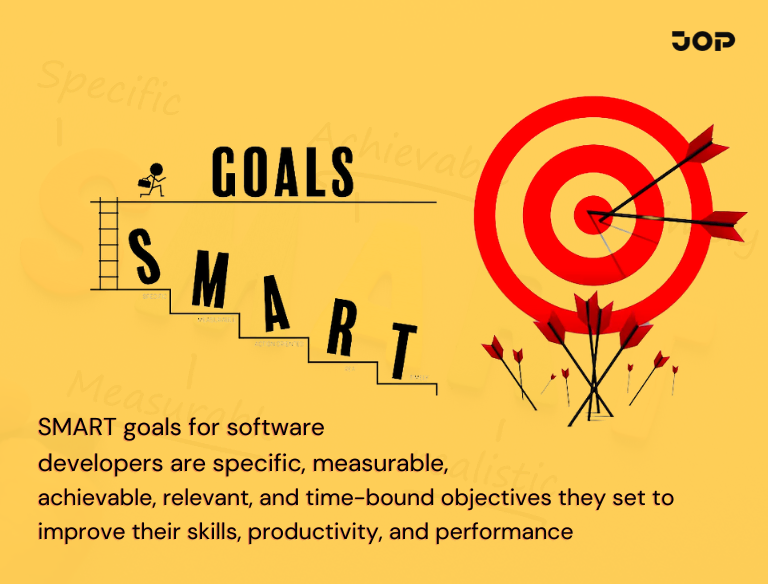Ever found yourself in a coding frenzy, racing against the clock to meet a seemingly impossible deadline?
Or maybe you’ve experienced the frustration of having your priorities shift like quicksand, leaving you wondering where to focus your efforts next.
Well, you’re not alone. In the fast-paced world of coding, setting and achieving developer goals can be a real challenge.
But fret not because, in this blog, we’re diving into the art of SMART goal-setting specifically tailored for software developer performance goals examples.
What are SMART Goal Examples for Software Developers?
SMART goals for developers are specific, measurable, achievable, relevant, and time-bound objectives they set to improve their skills, productivity, and performance.By setting SMART goals for software developers can focus on specific areas of improvement, track their progress, and achieve their objectives in a timely and efficient manner.
10 SMART Goals for Software Engineers
1. Learn new programming languages
Learning new programming languages is like adding new tools to your toolbox. It broadens your skills and makes you more versatile, which can lead to solving problems more creatively and efficiently.
SMART goal example:“Within six months, I will become proficient in Python by completing two online courses and building a small web application. I will measure my progress by tracking the number of projects completed and my ability to solve complex coding challenges in Python.”
Goal breakdown:
- Specific: The goal specifies the language (Python) and the target (proficiency).
- Measurable: Progress can be measured by completing courses, projects, and problem-solving ability.
- Achievable: The goal is realistic and attainable within six months.
- Relevant: Learning Python is relevant to the developer’s career and industry.
- Time-bound: A clear timeframe of six months is provided for achieving proficiency.
2. Build an Online Presence Through Blogging and Social Media
Think of this as having a megaphone in the tech community. Building a personal brand and online presence lets you share your expertise, connect with fellow devs, attract job opportunities and clients, and stay on top of what’s happening in the industry.
SMART goal for developer example: “Over the next year, I will build my personal brand by regularly publishing one high-quality technical blog post per month and actively engaging with the software development community on LinkedIn. I will measure my progress by tracking the growth in my LinkedIn connections and the number of views and comments on my blog posts.”
Goal breakdown:
- Specific: The goal specifies the actions – blogging and engaging on LinkedIn.
- Measurable: Progress can be tracked through the number of blog posts, LinkedIn connections, and engagement metrics.
- Achievable: Publishing one blog post per month is manageable and realistic.
- Relevant: Building a personal brand is relevant to career growth and networking.
- Time-bound: A timeframe of one year is set for achieving these objectives
3. Develop Leadership Skills for Career Growth
You become great coders and influential leaders by developing leadership and management skills. This prepares you for higher roles where you can guide teams and projects.
SMART goal example: “Over the next two years, I will actively develop my leadership and management skills by participating in at least one leadership training program, taking on a mentorship role for junior developers, and successfully leading a cross-functional project. I will measure my progress by seeking feedback from colleagues and supervisors and tracking my career advancements within the organization.”
Goal breakdown:
- Specific: The goal specifies actions like training, mentorship, and project leadership.
- Measurable: Progress can be measured through feedback, career advancements, and successful project completion.
- Achievable: The goal is realistic over two years and aligns with career growth aspirations.
- Relevant: Developing leadership and management skills is relevant to advancing to a higher position.
- Time-bound: A clear timeframe of two years is provided for achieving these skills and advancing in one’s career
Want to see how SMART goals and effective execution can boost developer performance? Discuss this on a demo with our Goal-setting and Strategy Execution experts.
Drive Performance With a Proven Framework
Wanna see how SMART goals and effective execution can boost developer performance?
Drive Performance With a Proven Framework
Wanna see how SMART goals and effective execution can boost developer performance? Talk to our Goal-setting and Strategy Execution experts.
4. Increase your professional network
Think of professional networking as expanding your horizons. When you increase your professional network, you tap into a vast pool of knowledge, potential collaborators, and opportunities. It’s like opening doors to new insights and career prospects.
SMART goal example: “Over the next year, I will actively grow my professional network by attending at least four industry conferences or meetups, connecting with at least 20 new professionals on LinkedIn per month, and initiating one informational interview per month with a senior industry expert. I will measure my progress by tracking the number of new connections made, the frequency of informational interviews, and the opportunities that arise from my expanded network.”
Goal breakdown:
- Specific: The goal specifies actions, such as attending events, connecting on LinkedIn, and conducting informational interviews.
- Measurable: Progress can be tracked through the number of new connections, informational interviews, and opportunities generated.
- Achievable: These actions are realistic and achievable within a year.
- Relevant: Increasing one’s professional network is relevant to career growth and staying informed.
- Time-bound: A timeframe of one year is set for achieving network expansion goals.
5. Improve coding skills and efficiency
Think of coding skills as a craftsman sharpening their tools. You become more effective at your core job by improving your coding and efficiency skills. It’s like fine-tuning a race car for optimal performance.
SMART goal example: “Over the next six months, I will improve my coding skills and efficiency by dedicating at least two hours weekly to focused coding practice, participating in one coding challenge or hackathon per month, and seeking feedback from colleagues on my code quality. I will measure my progress by tracking my coding challenge rankings, the complexity of projects I can handle, and the reduced code review comments.”
Goal breakdown:
- Specific: The goal specifies actions like daily practice, coding challenges, and feedback-seeking.
- Measurable: Progress can be measured through coding challenge rankings, project complexity, and code review feedback.
- Achievable: Two hours per weekday is a reasonable commitment for skill improvement within six months.
- Relevant: Improving coding skills and efficiency directly benefits a Software Developer’s daily work.
- Time-bound: A six-month timeframe is provided for achieving these skill improvements.
Try setting these SMART goals to transform your software development skills and professional growth.
6. Improve communication and collaboration skills
Improved communication and collaboration skills allow you to work seamlessly with others, translating your technical expertise into effective teamwork. It’s like ensuring all instruments play in harmony.
SMART goal example: “Over the next year, I will enhance my communication and collaboration skills by attending a communication skills workshop, actively participating in team meetings, and initiating one-on-one meetings with team members to understand their perspectives and needs better. I will measure my progress by soliciting feedback from team members and tracking improvements in meeting productivity and project collaboration.”
Goal breakdown:
- Specific: The goal specifies actions such as workshop attendance, active participation, and one-on-one meetings.
- Measurable: Progress can be measured through feedback from team members, meeting productivity improvements, and enhanced project collaboration.
- Achievable: Attending a workshop and engaging in team activities are feasible within a year.
- Relevant: Improving communication and collaboration skills directly benefits teamwork and project success.
-
Time-bound: A timeframe of one year is set for achieving these skill enhancements
7.Enhance Knowledge of Design Patterns
Understanding design patterns is akin to having a well-organized toolkit, enabling you to apply proven solutions to common software design challenges. This knowledge leads to more maintainable and scalable codebases.
SMART goal example: “Over the next four months, I will deepen my understanding of design patterns by reading two recognized books on the subject and implementing at least three patterns in a personal project. I will dedicate three hours weekly to studying and application. Progress will be measured by the successful integration of these patterns and code reviews from peers.”
Goal breakdown:
- Specific: The goal outlines actions such as reading specific books and applying design patterns in a project.
- Measurable: Progress is quantifiable through the number of patterns implemented and feedback from code reviews.
- Achievable: Allocating three hours weekly is a realistic commitment to achieve this goal within four months.
- Relevant: Enhancing knowledge of design patterns directly contributes to writing efficient and maintainable code.
- Time-bound: A clear timeframe of four months is set to achieve this goal
8. Gain Cross-Functional Experience in Software Development
Imagine software development as a puzzle, with each piece representing a different role. When you work on cross-functional teams, you get to try out various pieces of the puzzle, gaining a broader perspective. Corporate performance management system can support this versatility by aligning team roles with organizational goals. It’s like becoming a versatile player in a game with multiple roles.
SMART goal example: “Over the next year, I will actively seek opportunities to work on cross-functional teams by volunteering for projects outside of my primary role, participating in at least one project each quarter that involves a different area of software development (e.g., design, QA, DevOps), and collaborating with team members from diverse backgrounds. I will measure my progress by tracking the number of cross-functional projects completed, the skills acquired, and feedback from team members.”
Goal breakdown:
- Specific: The goal specifies actions like project involvement, diversity of roles, and collaboration.
- Measurable: Progress can be measured through the number of cross-functional projects completed, acquired skills, and feedback from team members.
- Achievable: Participating in one project per quarter is manageable over a year.
- Relevant: Gaining experience in different areas of software development makes one a well-rounded developer.
- Time-bound: A timeframe of one year is set for achieving these cross-functional experiences.
9. Improve testing and debugging skills
Think of testing and debugging skills as a software developer’s superpower. When you improve these skills, you become wizards at spotting and fixing issues in your code. It’s like having a magic wand to ensure your creations work flawlessly.
SMART goal example: “Over the next six months, I will focus on improving my testing and debugging skills by actively seeking out and resolving at least five critical bugs in our software, attending two workshops or courses related to software testing, and maintaining a log of debugging techniques and lessons learned. I will measure my progress by tracking the number of critical bugs resolved, the knowledge gained from workshops, and the effectiveness of my debugging techniques.”
Goal breakdown:
- Specific: The goal specifies actions such as bug resolution, workshop attendance, and maintaining a log.
- Measurable: Progress can be measured through the number of critical bugs resolved, knowledge gained, and the effectiveness of debugging techniques.
- Achievable: Resolving five critical bugs and attending workshops within six months is realistic.
- Relevant: Improving testing and debugging skills directly contributes to software quality.
- Time-bound: A clear timeframe of six months is provided for achieving these skill enhancements.
10. Develop skills in user experience (UX) design
Imagine software development as building a car. You create the engine, but UX design ensures the car is comfortable, intuitive, and a joy to drive. When you develop UX design skills, you improve at making software users love to use.
SMART goal example: “Over the next year, I will develop my skills in user experience (UX) design by enrolling in an online UX design certification program, actively participating in at least one UX-related project within my organization, and creating a portfolio of at least three UX design projects. I will measure my progress by completing the certification program, the quality of my UX design work, and the feedback from end-users.”
Goal breakdown:
- Specific: The goal specifies actions such as certification, project participation, and portfolio creation.
- Measurable: Progress can be measured through certification completion, project quality, and user feedback.
- Achievable: Completing an online certification program, participating in a project, and creating a portfolio within a year is realistic.
- Relevant: Developing UX design skills complements software development, enhancing the user experience.
- Time-bound: A timeframe of one year is set for achieving these UX design skill developments.
Common Challenges Software Engineers Face in Goal-Setting
1. Lack of clarity in work and expectations
Imagine you’re working on a project, but you don’t have a clear picture of the end goal or the timeline. It can be demotivating and even lead to inefficient work. As a leader or manager, it’s crucial to ensure your developers have a clear understanding of their tasks and how they fit into the bigger picture.
2. Setting unrealistic goals
We all love a challenge, but setting goals that are completely out of reach can be a recipe for disaster. It can lead to burnout and a lot of unnecessary stress. So, it’s important for developers to set goals that are challenging but still attainable, given the resources and time available. Finding that balance is the key.
3. Not setting SMART goals
If you set software goals that are vague or lack clear measures of success, it’s like sailing without knowing your destination. Encourage your developers to make their goals specific and measurable so they can track their progress effectively.
Not sure how to define SMART goals for your developers? Let’s discuss how to set and track impactful SMART goals through a demo.
Drive Performance With a Proven Framework
Wanna see how SMART goals and effective execution can boost developer performance? Talk to our Goal-setting and Strategy Execution experts.
Drive Performance With a Proven Framework
Wanna see how SMART goals and effective execution can boost developer performance? Talk to our Goal-setting and Strategy Execution experts.
4. Not having a plan of action
Setting a goal is just the first step. If you don’t have a plan in place, it’s like setting off on a road trip without a map. Developers need to outline the steps, resources, and milestones to reach their goals. Using goal-setting software can streamline this process, ensuring they stay on track and focused. Without a plan, they might waste time on the wrong things or feel lost in their journey.
5. Too many goals
Juggling too many software goals at once can be overwhelming. Imagine trying to focus on multiple tasks simultaneously – it’s tough! Encourage your developers to prioritize their goals and concentrate on a few important ones at a time. Quality work often comes from focused efforts.
6. Not being flexible
Lastly, in the world of software development, things can change in the blink of an eye. Developers must be flexible and open to adjusting their goals or strategies when needed. Sometimes, unexpected opportunities or challenges come up, and being rigid can hold you back.
7. Not using performance management tools
How does it feel when you are on a development sprint and cannot find that spreadsheet where you have written your goals? Feels like punching the wall, right? Performance management system lets you manage your and your team’s goals smoothly with additional productivity features like real-time feedback and progress analysis.
If you are experiencing these challenges, you could take external help to create meaningful goals and an effective strategy implementation plan for your development team.
Rather than managing your team’s goals on a spreadsheet, you could use a more efficient way of a dedicated platform like JOP.
See what a productive SMART goals management platform and personalized guidance can do for your software development team. Schedule a demo!

Ashish Kumar
Content Marketer
Hey folks, I'm Ashish, your friendly content marketer, making the goal-setting and strategy execution a bit simpler for the team players. What drives me at work is my mission to help professionals perform better with purpose-driven goal-setting and the way of working. I think every professional should have a purpose beyond monetary goals and a common vision that brings about teamwork. I work closely with my team and always try to make my write-ups more reader-centric and helpful. Away from my desk, I often go out to hike, play football, be with my family, and minimize my screen time (yeah, the internet is overwhelming!). Here is my LinkedIn if you wanna reach out to me. Read More
 Ashish Kumar
Ashish Kumar


